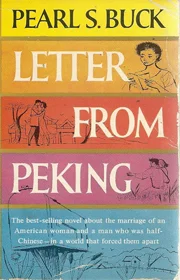
“Letters from Peking” is a captivating historical novel set in post-World War II China, penned by author Pearl S. Buck. The story unfolds against the backdrop of a transforming nation, as political unrest and cultural shifts sweep through China. The narrative is enriched by the exchange of letters between two characters, unveiling a poignant tale of love, sacrifice, and the struggle for identity in a rapidly changing society. As the characters grapple with personal dilemmas and societal upheavals, the novel offers a nuanced exploration of human resilience and the enduring power of connection. Buck’s vivid storytelling and deep understanding of Chinese culture create a compelling narrative that seamlessly weaves together the personal and political, making “Letters from Peking” a thought-provoking and emotionally resonant journey through a pivotal period in China’s history.
Read Letters from Peking Flipbook:
Listen to Letters from Peking Audiobook:
Title: “Letters from Peking”
Author: Pearl S. Buck
Year Published: 1957
Setting: Post-World War II China
Format: Epistolary novel, told through exchanged letters
Themes: Explores love, sacrifice, and identity against the backdrop of political and cultural shifts
Narrative Style: Skillfully weaves personal and political themes
Characters: Intricately crafted individuals navigating personal dilemmas within the context of societal change
Author’s Expertise: Reflects Pearl S. Buck’s deep understanding of Chinese culture
Overall Impression: A compelling and emotionally resonant portrayal of a society in transformation.
Global Impact: “Letters from Peking” was well-received internationally and contributed to Pearl S. Buck’s reputation as a prolific American author with a deep understanding of Chinese culture.
Pulitzer Recognition: Pearl S. Buck, who was the first woman to receive the Nobel Prize in Literature in 1938, won the Pulitzer Prize for Fiction in 1932 for her novel “The Good Earth.”
Cultural Bridge: Buck’s novels, including “Letters from Peking,” are praised for their role in bridging cultural gaps and fostering understanding between Western and Eastern perspectives.
Adaptation: While “Letters from Peking” itself hasn’t been adapted into a major film or television production, some of Buck’s other notable works, like “The Good Earth,” have seen successful adaptations.
Activism: In addition to her literary contributions, Pearl S. Buck was a social activist and advocate for humanitarian causes, particularly in promoting interracial and international understanding.
Legacy: Pearl S. Buck’s impact extends beyond her novels; she co-founded the East and West Association, aimed at promoting cultural exchange between Asia and the West.
Personal Connection: Buck spent a significant part of her life in China, as her parents were missionaries, which profoundly influenced her writing and understanding of Chinese culture.
Pseudonym: Early in her career, Buck wrote under the pseudonym John Sedges, using a male name to navigate gender bias in the literary world. Her gender was only revealed after the success of “The Good Earth.”
Second Nobel Nomination: Pearl S. Buck received a second Nobel Prize nomination in 1938 but did not win. Her contributions to literature and understanding between cultures, however, remained significant.
Literary Criticism: While some critics praised Buck’s ability to convey the complexities of Chinese society, others raised concerns about her portrayal of the culture from a Western perspective. This sparked discussions on cultural representation in literature.